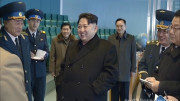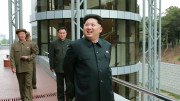North Korea appears to have launched a broad project to develop civilian satellite technology and will meet quarterly to assess its progress.
The project was disclosed last week when state media reported a “regular meeting” of the “Non-permanent Space Science and Technology Committee” (국가비상설우주과학기술위원회) was held at Kim Il Sung University in Pyongyang on March 23.
It is the first time the committee has been mentioned in externally accessible state media.
The report said the committee was organized by a state measure “to bring about a radical turn in outer space development by facilitating the involvement of more universities and scientific research institutes in space science and technology research.”
As such, the meeting brought together officials from North Korea’s space agency, the National Aerospace Development Administration (NADA), the State Commission of Science and Technology, the Education Commission, the State Academy of Sciences and universities and research institutions, according to the report.
At the meeting, the universities and research institutions presented their research carried out in 2022 and the first quarter of 2023 and were assigned tasks for the second quarter. The meeting “seriously discussed the successes and the deviations and ways to tackle them,” said the Korean Central News Agency.
Specifically, the committee called for “special efforts” to core technical research for the development of satellites, the report said.
It named several goals for the satellite project, including “agricultural production, meteorological observation, natural resources exploration, monitoring of natural disasters such as typhoon, flood and tidal wave, and the development of Korean-style communications system.”
The latter is particularly interesting as a satellite-based communications system could expand telecommunications access to underserved areas across the country but also expose the nation’s internal communications to eavesdropping.
The committee will meet quarterly and is chaired by Pak Thae Song, secretary of the Central Committee of the Workers’ Party of Korea, and long associated with the country’s science and technology efforts.
Korea Space Association
In 2016, the country organized the “Korea Space Association,” which appeared to have the same broad aims as the new committee but was more research-based and without the same high-level political backing.
State media described it as “a non-governmental organization that groups scientists and technicians, university teachers and researchers engaged in the field of space technology and its application.”
It was chaired by Ri Won Chol, vice-president of Kim Chaek University of Technology, and most of its announced activities involved scientific symposia. It was in existence until at least November 2019, when it participated in an annual conference on space technology but has not been mentioned in state media since.
Satellite Plans
News of the committee comes as North Korea is preparing to launch a military surveillance satellite. The country has said it plans to have preparations completed by April, and large-scale construction is currently in progress at the Sohae Satellite Launch Facility.
North Korea last launched a satellite in February 2016 when the Kwangmyongsong-4 satellite was put into space on an Unha rocket from Sohae. The launch was successful in putting the satellite into orbit; however, it appears the craft was partially or completely damaged. Observers have not reported receiving signals from the satellite, and North Korea has published no data to show it is operational.
The country signaled its intention to put more satellites into space as long ago as 2015 when an official of the state space agency told the Associated Press that it plans to launch additional satellites.





